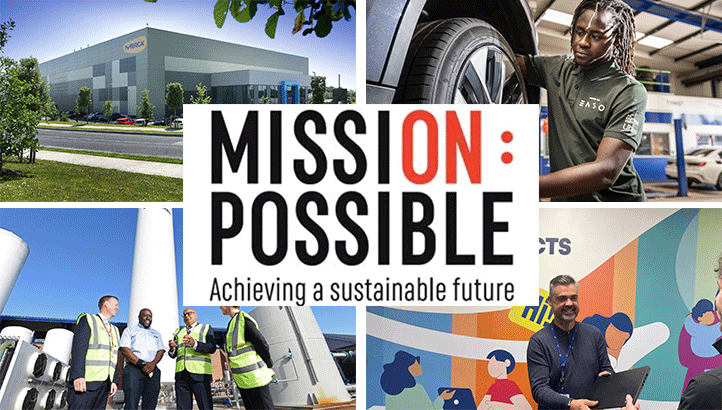Uber’s latest EV incentive and $3bn of energy transition investment: The sustainability success stories of the week
By Sarah George
Copyright edie

Published every week, this series charts how businesses and sustainability professionals are working to achieve their ‘Mission Possible’ across the campaign’s five key pillars – energy, resources, infrastructure, mobility and sustainability leadership.
Across the UK and across the world, leading businesses, cities, states and regions are turning environmental ambitions into action. Here, we round up five positive sustainability stories from this week.
ENERGY: Macquarie exceeds $2bn low-carbon energy investment ambition
Macquarie Asset Management this week confirmed the final close of its Green Energy Transition Solutions fund, which has secured more than $3bn in total fund and co-investment targets – far exceeding its original $2bn ambition.
The fund has raised more than $2.4bn of commitments. An additional $647m of committed co-investment has also been made to its portfolio companies.
A dozen closed investments have been made through the fund. It has supported energy transition activities including energy storage, energy distribution, carbon capture, transport decarbonisation and next-generation fuels for aviation and industry.
“The significant investment requirements of the global energy transition present an opportunity to build the infrastructure of tomorrow while delivering attractive risk-adjusted returns for our investors,” said Macquarie Asset Management’s executive director for Green Investments, Chris Archer.
Archer’s team manages more than $17bn in assets globally.
RESOURCES: Virgin Media O2 expands tech reuse programme
The UN has claimed that electronic waste (e-waste) is the world’s fastest-growing domestic waste stream. 62 million tonnes of e-waste were generated worldwide in 2022, 82% more than in 2010. Less than one-quarter is documented as properly recycled.
Several companies are working to reduce e-waste and to have a positive social impact by offering device-sharing or refurbished devices to low-income communities and individuals.
Among them is British telecoms firm Virgin Media O2. It recently expanded its #CovConnects programme to rehome unused tech devices for a further 18 months.
In partnership with Coventry City Council, the project was created to bolster digital inclusion across the city. It collects used devices from local businesses and public sector organisations, ready for refurbishment and rehoming locally. Some 40% of the city’s residents do not have access to a laptop, so it’s hoped that the programme will enhance digital inclusion, enabling people to complete tasks such as studying, job hunting and online banking.
Virgin Media O2’s chief sustainability officer Dana Haidan said: “Our ambition is to create a model of circularity that has a reuse-first approach, enabled via local device banks, which can then be replicated and rolled out across the UK.”
MOBILITY: Uber offers discounted EV tyres to drivers
Uber is aiming for half of its miles in London and six other European capital cities to be completed in electric vehicles (EVs) by the end of 2025.
It has introduced multiple incentive and support packages for drivers looking to make the shift to an EV in the UK’s capital, including hundreds of additional on-street chargers near drivers’ homes.
Now, Uber has partnered with tyre manufacturer ENSO to offer drivers a 50% discount on new tyres, which they can claim via the Uber Marketplace app.
ENSO, an Earthshot Prize Finalist, produces tyres that increase EV range, reduce tyre pollution, and last longer than standard alternatives.
“Uber drivers are already switching to electric vehicles five times faster than the general public, and initiatives like this help us keep up that momentum,” said Uber UK’s head of electrification, Brit Grant.
“By reducing running costs and cutting emissions, this partnership supports our commitment to a cleaner, greener future for cities like London.”
THE BUILT ENVIRONMENT: Merck opens new low-carbon manufacturing hub in Cork, Ireland
Life sciences and technology giant Merck this week opened a filter manufacturing facility in Cork, Ireland, which boasts zero operational emissions.
The 3,000-square-meter cleanroom facility in Blarney Business Park will run on 100% renewable electricity. It is fitted with a compressed air heat recovery system as well as heat pumps, enhancing energy efficiency and avoiding the need for gas use.
Merck is notably aiming to achieve net-zero operational emissions globally by 2040.
Additionally, more than 95% of the purified water used in manufacturing at Blarney will be reused, significantly improving water stewardship and operational efficiency.
Merck invested €150m to develop the new facility. It is due to begin producing filters in late 2025, using these solutions in the manufacture of vaccines, antibodies and gene therapy solutions.
SUSTAINABILITY LEADERSHIP: Bodycote delivers energy transition milestone with two fossil-free sites
Bodycote has achieved zero-emission operations at two of its UK plants by electrifying processes, enhancing efficiency and procuring renewable electricity.
The business, which provides heat treatment for turbine blades, has switched to 100% electricity for its energy needs at its Derby and Rotherham locations.
It has also installed a new closed-circuit adiabatic cooling system in Derby. The system replaces evaporative cooling towers, resulting in a 73% reduction in electricity consumption and 85% reduction in water use.
Overall, the business has recorded a 27% reduction in energy intensity and 29% reduction in energy-associated carbon emissions since 2019. It is aiming for an emissions reduction of 46% by 2030, as part of its Science-Based Targets on climate.
“Our customers, many with ambitious 2030 sustainability targets, are looking for suppliers who can support their decarbonisation efforts,” said Bodycote CEO Jim Fairbairn.
“Recently, a customer with a 90% carbon reduction goal came to us because of the impact offered by our lower-carbon thermal processing. These are real demands, and the clock is ticking.”
Bodycote is one of many companies decarbonising its operations. A recent survey of more than 1,900 sustainability executives globally revealed that 82% have seen economic benefits from the low-carbon transition.



